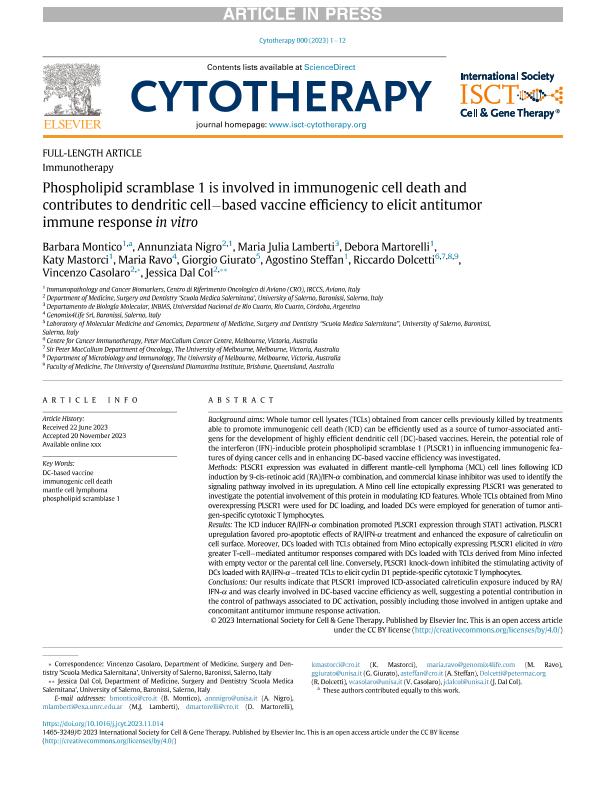Artículo
Phospholipid scramblase 1 is involved in immunogenic cell death and contributes to dendritic cell–based vaccine efficiency to elicit antitumor immune response in vitro
Montico, Barbara; Nigro, Annunziata; Lamberti, María Julia ; Martorelli, Debora; Mastorci, Katy; Ravo, Maria; Giurato, Giorgio; Steffan, Agostino; Dolcetti, Riccardo; Casolaro, Vincenzo; Dal Col, Jessica
; Martorelli, Debora; Mastorci, Katy; Ravo, Maria; Giurato, Giorgio; Steffan, Agostino; Dolcetti, Riccardo; Casolaro, Vincenzo; Dal Col, Jessica
 ; Martorelli, Debora; Mastorci, Katy; Ravo, Maria; Giurato, Giorgio; Steffan, Agostino; Dolcetti, Riccardo; Casolaro, Vincenzo; Dal Col, Jessica
; Martorelli, Debora; Mastorci, Katy; Ravo, Maria; Giurato, Giorgio; Steffan, Agostino; Dolcetti, Riccardo; Casolaro, Vincenzo; Dal Col, Jessica
Fecha de publicación:
12/2023
Editorial:
Taylor & Francis As
Revista:
Cytotherapy
ISSN:
1465-3249
Idioma:
Inglés
Tipo de recurso:
Artículo publicado
Clasificación temática:
Resumen
Background aims: Whole tumor cell lysates (TCLs) obtained from cancer cells previously killed by treatments able to promote immunogenic cell death (ICD) can be efficiently used as a source of tumor-associated antigens for the development of highly efficient dendritic cell (DC)-based vaccines. Herein, the potential role of the interferon (IFN)-inducible protein phospholipid scramblase 1 (PLSCR1) in influencing immunogenic features of dying cancer cells and in enhancing DC-based vaccine efficiency was investigated. Methods: PLSCR1 expression was evaluated in different mantle-cell lymphoma (MCL) cell lines following ICD induction by 9-cis-retinoic acid (RA)/IFN-α combination, and commercial kinase inhibitor was used to identify the signaling pathway involved in its upregulation. A Mino cell line ectopically expressing PLSCR1 was generated to investigate the potential involvement of this protein in modulating ICD features. Whole TCLs obtained from Mino overexpressing PLSCR1 were used for DC loading, and loaded DCs were employed for generation of tumor antigen-specific cytotoxic T lymphocytes. Results: The ICD inducer RA/IFN-α combination promoted PLSCR1 expression through STAT1 activation. PLSCR1 upregulation favored pro-apoptotic effects of RA/IFN-α treatment and enhanced the exposure of calreticulin on cell surface. Moreover, DCs loaded with TCLs obtained from Mino ectopically expressing PLSCR1 elicited in vitro greater T-cell–mediated antitumor responses compared with DCs loaded with TCLs derived from Mino infected with empty vector or the parental cell line. Conversely, PLSCR1 knock-down inhibited the stimulating activity of DCs loaded with RA/IFN-α–treated TCLs to elicit cyclin D1 peptide-specific cytotoxic T lymphocytes. Conclusions: Our results indicate that PLSCR1 improved ICD-associated calreticulin exposure induced by RA/IFN-α and was clearly involved in DC-based vaccine efficiency as well, suggesting a potential contribution in the control of pathways associated to DC activation, possibly including those involved in antigen uptake and concomitant antitumor immune response activation.
Archivos asociados
Licencia
Identificadores
Colecciones
Articulos (INBIAS)
Articulos de INSTITUTO DE BIOTECNOLOGIA AMBIENTAL Y SALUD
Articulos de INSTITUTO DE BIOTECNOLOGIA AMBIENTAL Y SALUD
Citación
Montico, Barbara; Nigro, Annunziata; Lamberti, María Julia; Martorelli, Debora; Mastorci, Katy; et al.; Phospholipid scramblase 1 is involved in immunogenic cell death and contributes to dendritic cell–based vaccine efficiency to elicit antitumor immune response in vitro; Taylor & Francis As; Cytotherapy; 26; 2; 12-2023; 145-156
Compartir
Altmétricas



